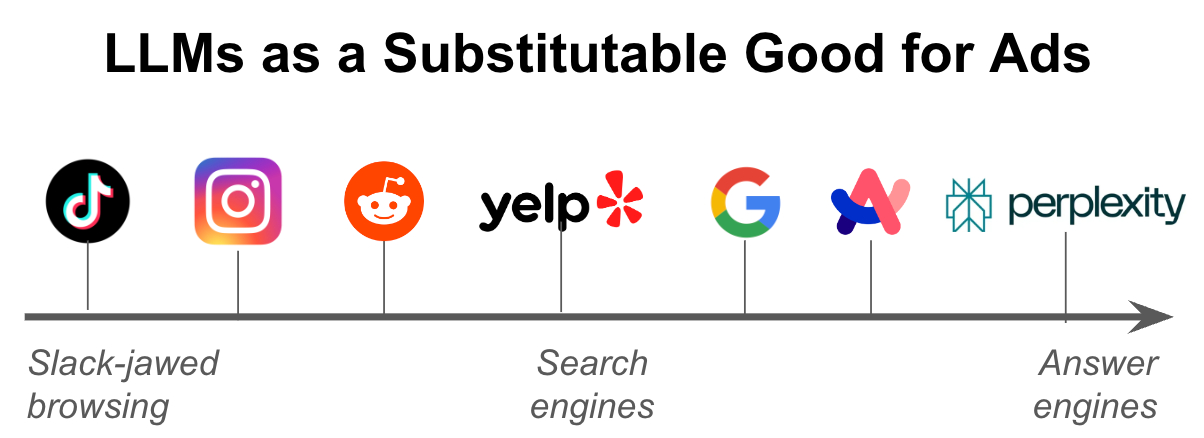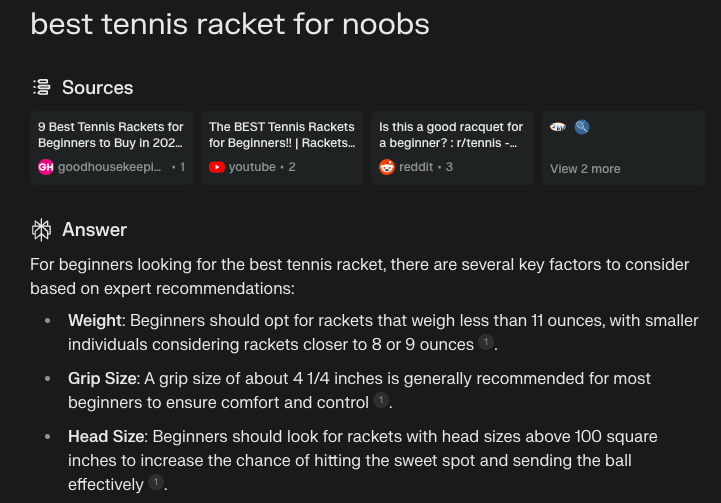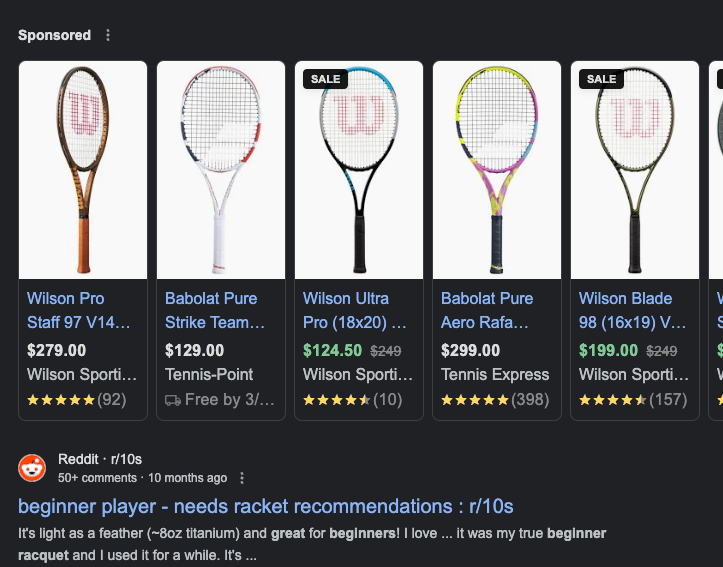
AI is going to fundamentally change ads and, with it, the internet. Smart investors, founders, and researchers will try and get a grip on that change early. The job of advertising won’t disappear, but how and when we access ads will. Let me walk you through where we are now and where we will be going.
Ads are more important than you think
The theory goes something like this: When you give something away for free, people will use it more. If users interact with your free service in a way that allows you to better target ads, you have made an incredible flywheel of growth (like Google or Meta).
This flywheel subsidizes the entire consumer internet. Video, social media, news, maps—all of these services rely directly or indirectly on advertising subsidies.
Over the years, people have grown frustrated with the more unsavory aspects of ads—pop-ups and privacy invasions, to name two. I agree with much of the criticism. Ads can be intrusive and invasive, and the desire to maximize the time users spend on free services can lead to harmful addictions. I have written for years how dangerous ad models can be, so I’m not trying to defend them as some holy paragon.
However, the criticism misses some of what is integral about ads. There is a popular quote that has bugged me for years. You’ve seen it before: “If the service is free, you are the product.” No! Wrong! If the service is free, the clicks on the ads are the product. This is fundamentally different. A free service with ads is monetizing users’ actions, not users themselves. Clicks on ads are good because they reveal a genuine demand for the goods the supplier is selling. Users see stuff they want to buy. Ad platforms make money off the top. This is wonderful! Everyone wins in this transaction. In return, we get an abundance of cheap or free goods. This system has made lots of money for everyone involved: Ads have been between 1–2 percent of U.S. GDP since 1920—currently a $361 billion annual business.
The ad engine is the heart of the internet. Every B2B transaction, SaaS app, and content website is reliant on the flow of user attention. Since ads subsidize essentially every step of the attention funnel, all digital services are reliant on them, directly or indirectly. In academic terms, advertising is the entrenched techno-economic paradigm that dictates how attention flows around the world.
AI is going to change our ad experience and, with it, the internet.
The AI-disrupts-ads argument is complicated
The question for AI is when it acts as a replacement for what would have previously been an ad. I would suggest that the closer a user goes to wanting a specific task done or question answered, the more likely it is to be replaced by an AI product.
Source: Graphic by the author.
The further to the right a product is on our scale, the more likely it is to be a purely LLM-driven experience. An easy example to grok is Google. Rather than getting 10 blue links from Google for a search request—where you have to click through multiple links to find the information you are looking for—you can use something like Perplexity, an LLM-powered “answer engine,” which will just answer your question.
The problem is that this experience sends far less traffic to content websites and, by extension, surfaces way fewer ads. Look how many results there are for my search for “best tennis racket for noobs.” There is space for maybe one ad, and the links to sources are not very prominent. (Further down in the answer, Perplexity recommended specific rackets).
Source: Screenshot of Perplexity by the author.You could argue that Perplexity could increase the prominence of the sources or input more ads. But, as someone who examines the clickthrough rates on hyperlinked sources for Every’s articles, I can attest that the average reader never actually clicks through to them. Instead, the reader will go straight to the AI's product recommendations. AI and chatbots are an evolution in human-computer interaction; it feels unlikely that the ad paradigm of yesterday will neatly transfer over.
Compare Perplexity’s result to Google’s.
Source: Screenshot of Google by the author.
On the Google webpage, there is a lot more surface area for ads, including images, and I have to scroll to find what I’m looking for. There were at least eight sponsored results, and it was challenging to tell what was even an ad (a problem for another blog post).
In the inverse, the further into passive consumption—such as mindlessly scrolling through social media—users get, the less likely that the ads being sold will be disrupted. Only if I open ChatGPT to be entertained instead of TikTok should these companies be concerned. This possibility feels relatively low. There is a reason that Meta is investing billions into generative AI: Zuckerberg clearly thinks that more AI-generated stuff will benefit his business.
The open question is if/when AI can become a substitutable good for labor that consumers used to do themselves.
Next week I’ll be in New York for meetings, and I’m overwhelmed trying to find somewhere good to eat (please email me your favorite cheap suggestions). Rather than flipping through OpenTable, Yelp, and Resy to find a spot for dinner on Friday night, I could ask an LLM to do that for me. AI agents—a specialized type of LLM—can interact directly with the restaurant review aggregators, find somewhere I would like, and make the reservation. The tech is kind of there, and startups like Lindy sell early versions of this tech for B2B clients. AI agents are clearly the next frontier—it’s where OpenAI is focusing its resources. In my conversations with sources, many in the AI community feel like these tools will change everything.
When you combine the ability of AI to disrupt both how we accomplish tasks and find answers online, the result is that the ad-driven internet becomes broken.
A brave (more expensive) new world
This new ad market may be materially smaller than what we have today while being better for consumers. It will be faster and easier for people to get stuff done online. You won’t have to suffer through as many ads.
Unfortunately, AI will be an apocalypse for websites that rely on traffic from outside sources. Everything from humble technology newsletters to specialty goods providers will struggle. Either content they produce will be used by the LLM without accreditation or the goods they sell won’t be surfaced at all. Remember: LLMs don’t output the same number of results as a typical Google or Yelp search.
Fewer ads mean fewer subsidized services, decreasing accessibility for all.
As a result, the number of companies that make money online will contract. The core economic flywheel of ad-subsidized content and services will slow down or maybe even break. But we shouldn’t be surprised! The same thing happened to local news in the 2000s with the internet—a roughly 33 percent collapse in the number of local newspapers, with all publications reducing the volume of content they published.
In general, the companies that will thrive are the ones favored by the algorithm. This may sound bad—but it is also how the internet operates today. Search engine optimization (SEO) is an entire industry. Supply still needs to connect with demand, only now, the companies that will do the best are ones that will do AI optimization (AIO). There will be a cottage industry of content about how to optimize your site so ChatGPT surfaces it in queries.
When I started researching this topic, I wanted an answer that would clearly point to whether this change was good or bad. The reality is that it is unclear if an AI-driven internet is net-better for the world. Creative destruction, the process of change that leads to the destruction of existing economic structures, has long pushed society forward. But the internet is so important, and the impact of AI’s change is so dramatic, that it is hard for me to comprehend what it looks like on the other side. Let me know in the comments what you think or reply to this email: Will AI destroy ads for good? Will that destruction be good for us all?
Evan Armstrong is the lead writer for Every, where he writes the Napkin Math column. You can follow him on X at @itsurboyevan and on LinkedIn, and Every on X at @every and on LinkedIn.
The Only Subscription
You Need to
Stay at the
Edge of AI
The essential toolkit for those shaping the future
"This might be the best value you
can get from an AI subscription."
- Jay S.
Join 100,000+ leaders, builders, and innovators

Email address
Already have an account? Sign in
What is included in a subscription?
Daily insights from AI pioneers + early access to powerful AI tools












Comments
Don't have an account? Sign up!
I think that in the future it will be similar to now. If you google something today the first 4 items are ads, so Google shifted the best organic results for the company that paid the most. I think in the future probably the first 4 results of what an LLM will output will be paid. If you ask it: what are the best tennis balls, the first four results will be paid and the rest is what the LLM would show you organically. So the principal will be the same and it will probably be even harder to distinguish, what is the AIs „intelligence“ and what is their because a company paid for it. This will even be scarier if our (free) AI Agent doesn‘t buy the item that is best for us but the item a company paid to show the agent first.
@rafael.ungvari Maybe? on a technical level I don't know you accomplish that. I think LLMs act has harbingers of truth in a way that google doesn’t and isn’t congruent with native advertising. Not trusting 1 of 10 blue links is normal. Not trusting the total answer of an LLM is bad.
Evan, I think you might be misunderstanding the "you are the product" idea.
You wrote:
However, the criticism misses some of what is integral about ads. There is a popular quote that has bugged me for years. You’ve seen it before: “If the service is free, you are the product.” No! Wrong! If the service is free, the clicks on the ads are the product. This is fundamentally different. A free service with ads is monetizing users’ actions, not users themselves.
Here's the way the media company thinks about this:
"We need to go sell our ads. We're going to be able to do that with two things:
1. the demographics of the audience. Are they a group that advertisers want to reach. (worth highlighting that the ad people use the word 'target' which of course, is a hunting term).
2. the actions of the audience. Can we get them in the mood to do something.
But in both cases, what's on offer is the audience. Their attention and the manipulation/shift in their actions.
Is there any doubt that using Facebook changes the people who use it? Changes their attention, their point of view, their heartrate, heartbreak and actions?
FB changes people the way US Steel changes iron.
That's what their factory does.
@sethgodin Thanks for the feedback! I personally delineate between users actions on the free platform vs users interaction with the ads. All the targeting in the world doesn't make a difference if the user doesn't actually engage with the ad. Audience action>audience access.
Facebook does change people who use it, but that is just as much through the interaction with the content as the advertisements. I would agree this is net bad but I feel that way about many content publishers and platforms. (which is what I called out here https://every.to/napkin-math/the-addiction-economy).
There is also a degree of infantilization that I disagree with in the "ads manipulate people view." People have agency and there is no threat of violence in an advertisement—they still have the free will to buy or not buy.
Thanks again for the feedback!
@ItsUrBoyEvan Well...
Do you think FB (or the New Yorker) is architected the way it is because of the business model?
https://www.ncbi.nlm.nih.gov/pmc/articles/PMC7173757/
Of course ads work. And ads manipulate us when they encourage us to do something we regret later.
It's a trap to pretend that it's all benign. Of course some serve a useful purpose. But they don't belong everywhere, they shouldn't be permitted to be targeted at everyone, and most of all, the creators of the media and the ads should take responsibility for the effects (not side effects) of their work.
Great article, Evan, and an incredibly important topic! One thing to recognize: The people at Perplexity are almost certainly planning how to monetize their LLM-based search engine beyond (or replacing) the $20/month subscription. I don't think they would want to offer advertisers the ability to influence answers, as that would destroy user trust. Instead, I imagine advertisers offered the ability to place their own LLM-based answers in parallel (to the right?) with these answers steering users to their products and providing hyperlinks to their own websites. Google could adopt this approach, thereby preempting such a move by Perplexity. Such an approach by LLM-based search engines could preserve the advertising revenues in the "system" while also creating greater value to users.
Clicks on ads are the result of people's actions. They can't be separated as inanimate. The "...you are the product" business drives this point home, but I don't like it.